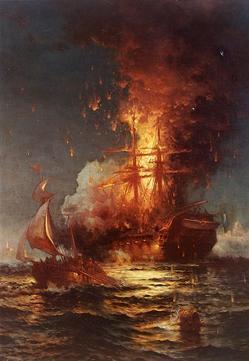 By Richard Norman
By Richard Norman
An early chapter of American history, not much spoken about in recent times, is in vogue: the Jefferson Administration’s encounter with the Barbary Pirates–which was the United States’ first foreign war and resulted in the birth of the Marines. Michael Oren’s new book (about American involvement in the Middle East from 1776 onwards) begins with it, and Christopher Hitchens, in this recent article, mentions some of the new works published on the subject.
Here is a brief introduction from an Oren talk at the Carnegie Council (podcast here):
The date was March 1785. Pirates from Tripoli, from Algiers (what is today Algeria), Tunis, (which is today Tunisia), and Morocco?the so-called Barbary States?had seized dozens of American ships in the Mediterranean and kidnapped more than 100 American sailors.
America was facing its first hostage crisis in the Middle East. And, since so much of America’s trade went through this area, it actually posed a mortal threat, an existential threat, to the fledgling and fragile economy of the newly independent United States. Now, Jefferson wanted to fight the pirates. He first turned to the Europeans and asked them to form a coalition against the pirates. They turned him down. Jefferson had no option but to turn to his own United States.
But America had a problem. America did not have a navy in 1785. America had managed to survive its war of independence without one warship intact. They had all been captured, sunk, or sold off. Nor did the United States in 1785 have the means for creating a navy. The states were still loosely federated under the Articles of Confederation. There was no federal government. There was no government that was capable of raising taxes to make a navy. Moreover, many Americans were afraid of having a navy. They had recently had a bad experience with a navy, the British navy, and were afraid that if America created a navy, it could turn its guns on America’s inchoate democratic institutions; it was liable to get America embroiled in all sorts of nasty European entanglements.
And, while Jefferson wanted to fight, a great many Americans said: No. It is better to negotiate with the pirates, better perhaps to pay them off, which was the age-old European practice. We should really do everything we can, they said, to avoid getting bogged down in an open-ended war in the distant Middle East.
Now, more than 220 years later, Americans are still confronting similar threats from the Middle East, and grappling with similar choices: whether to fight or to negotiate; whether to palliate their enemies in the region or to destroy them. Today, Americans are being asked to make fateful decisions in the Middle East, decisions that will not only impact their future but the future of people throughout the world.
And yet, few Americans are aware of the situation I just described to you this morning, aware that their own Founding Fathers faced these similar situations, situations not at all unlike their own today. Few Americans know of their very rich, centuries-long legacy in the Middle East. It’s a multifaceted heritage of war and statecraft, altruism and beneficence, wild artistic imaginings, and swashbuckling adventure?especially swashbuckling adventure.
The image above is of the frigate USS Philadelphia being burned in the Tripoli harbour in 1804.
